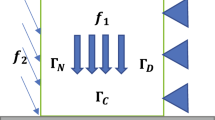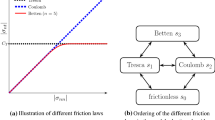Abstract
We study a posteriori error analysis of the virtual element method (VEM) for a simplified friction problem, which is a representative elliptic variational inequality of the second kind. By treating hanging nodes as vertices of polygonal elements, the virtual element method does not require any local mesh post-processing after the adaptive mesh refinement. In this work, residual type error estimators are derived for designing adaptive VEM to solve the simplified friction problem. Furthermore, the reliability and efficiency of the error estimators are proved. Finally, a numerical example is given to verify the theoretical results.




Similar content being viewed by others
References
Duvaut, G., Lions, J.L.: Inequalities in Mechanics and Physics. Springer, Berlin (1976)
Kikuchi, N., Oden, J.T.: Contact Problems in Elasticity: A Study of Variational Inequalities and Finite Element Methods. SIAM, Philadelphia (1988)
Han, W., Sofonea, M.: Quasistatic Contact Problems in Viscoelasticity and Viscoplasticity. American Mathematical Society and International Press, New York (2002)
Brezzi, F., Hager, W.W., Raviart, P.A.: Error estimates for the finite element solution of variational inequalities. Numer. Math. 28, 431–443 (1977)
Glowinski, R.: Numerical Methods for Nonlinear Variational Problems. Springer, New York (1984)
Djoko, J.K., Ebobisse, F., McBride, A.T., Reddy, B.D.: A discontinuous Galerkin formulation for classical and gradient plasticity–part 1: formulation and analysis. Comput. Methods Appl. Mech. Eng. 196, 3881–3897 (2007)
Wang, F., Han, W., Cheng, X.: Discontinuous Galerkin methods for solving elliptic variational inequalities. SIAM J. Numer. Anal. 48, 708–733 (2010)
Wang, F., Han, W., Cheng, X.: Discontinuous Galerkin methods for solving Signorini problem. IMA J. Numer. Anal. 31, 1754–1772 (2011)
Wang, F., Han, W., Cheng, X.: Discontinuous Galerkin methods for solving the quasistatic contact problem. Numer. Math. 126, 771–800 (2014)
Da Beirão, V.L., Brezzi, F., Marini, L.D.: Virtual elements for linear elasticity problems. SIAM J. Numer. Anal. 51, 794–812 (2013)
Antonietti, P.F., Da Beirão, V.L., Mora, D., Verani, M.: A stream function formulation of the Stokes problem for the virtual element method. SIAM J. Numer. Anal. 52, 386–404 (2014)
Perugia, I., Pietra, P., Russo, A.: A plane wave virtual element method for the Helmholtz problem. ESAIM M2AN 50, 783–808 (2016)
Zhao, J., Chen, S., Zhang, B.: The nonconforming virtual element method for plate bending problems. Math. Models Methods Appl. Sci. 26, 1671–1687 (2016)
Chen, L., Wei, H., Wen, M.: An interface-fitted mesh generator and virtual element methods for elliptic interface problems. J. Comput. Phys. 334, 327–348 (2017)
Da Beirão, V.L., Lovadina, C., Vacca, G.: Virtual elements for the Navier-Stokes problem on polygonal meshes. SIAM J. Numer. Anal. 56, 1210–1242 (2018)
Wriggers, P., Rust, W.T., Reddy, B.D.: A virtual element method for contact. Comput. Mech. 58, 1039–1050 (2016)
Wang, F., Wei, H.: Virtual element method for simplified friction problem. Appl. Math. Lett. 85, 125–131 (2018)
Wang, F., Wei, H.: Virtual element methods for obstacle problem. IMA J. Numer. Anal. 40, 708–728 (2020)
Feng, F., Han, W., Huang, J.: Virtual element methods for elliptic variational inequalities of the second kind. J. Sci. Comput. 80, 60–80 (2019)
Feng, F., Han, W., Huang, J.: Virtual element method for an elliptic hemivariational inequality with applications to contact mechanics. J. Sci. Comput. 81, 2388–2412 (2019)
Wang, F., Zhao, J.: Conforming and nonconforming virtual element methods for a Kirchhoff plate contact problem. IMA J. Numer. Anal. (2019). https://doi.org/10.1093/imanum/draa005
Ling, M., Wang, F., Han, W., Wang, C.: Virtual element method for an elliptic hemivariational inequality, submitted
Verfürth, R.: A Review of a Posteriori Error Estimation and Adaptive Mesh-refinement Techniques. Wiley, London (1996)
Ainsworth, M., Oden, T.J.: A Posteriori Error Estimation in Finite Element Analysis. Wiley, Chichester (2000)
Babuška, I., Strouboulis, T.: The Finite Element Method and its Reliability. Oxford University Press, Oxford (2001)
Cangiani, A., Georgoulis, E.H., Pryer, T., Sutton, O.J.: A posteriori error estimates for the virtual element method. Numer. Math. 137, 857–893 (2017)
Mora, D., Rivera, G., Rodrguez, R.: A posteriori error estimates for a virtual element method for the Steklov eigenvalue problem. Comput. Math. Appl. 74, 2172–2190 (2017)
Da Beirão, L., Da Veiga, G.M., Mascotto, L.: A posteriori error estimation and adaptivity in hp virtual elements. Numer. Math. 143, 139–175 (2019)
Chi, H., Da Beirão, L.V., Paulino, G.H.: A simple and effective gradient recovery scheme and a posteriori error estimator for the virtual element method. Comput. Methods Appl. Mech. Eng. 347, 21–58 (2019)
Chen, Z., Nochetto, R.H.: Residual type a posteriori error estimates for elliptic obstacle problems. Numer. Math. 84, 527–548 (2000)
Veeser, A.: Efficient and reliable a posteriori error estimators for elliptic obstacle problems. SIAM J. Numer. Anal. 39, 146–167 (2001)
Yan, N.: A posteriori error estimators of gradient recovery type for elliptic obstacle problems. Adv. Comput. Math. 15, 333–362 (2001)
Nochetto, R.H., Siebert, K.G., Veeser, A.: Pointwise a posteriori error control for elliptic obstacle problem. Numer. Math. 95, 163–195 (2003)
Bartels, S., Carstensen, C.: Averaging techniques yield reliable a posteriori finite element error control for obstacle problems. Numer. Math. 99, 225–249 (2004)
Braess, D.: A posteriori error estimators for obstacle problems-another look. Numer. Math. 101, 415–421 (2005)
Gudi, T., Porwal, K.: A posteriori error control of discontinuous Galerkin methods for elliptic obstacle problems. Math. Comput. 83, 579–602 (2014)
Wang, F., Han, W., Eichholz, J., Cheng, X.: A posteriori error estimates for discontinuous Galerkin methods of obstacle problems. Nonlinear Anal. Real World Appl. 22, 664–679 (2015)
Bostan, V., Han, W.: Recovery-based error estimation and adaptive solution of elliptic variational inequalities of the second kind. Commun. Math. Sci. 2, 1–18 (2004)
Bostan, V., Han, W., Reddy, B.D.: A posteriori error estimation and adaptive solution of elliptic variational inequalities of the second kind. Appl. Numer. Math. 52, 13–38 (2004)
Bostan, V., Han, W.: A posteriori error analysis for a contact problem with friction. Comput. Methods Appl. Mech. Eng. 195, 1252–1274 (2006)
Wang, F., Han, W.: Another view for a posteriori error estimates for variational inequalities of the second kind. Appl. Numer. Math. 72, 225–233 (2013)
Wang, F., Han, W.: Reliable and efficient a posteriori error estimates of DG methods for a simplified frictional contact problem. Int. J. Numer. Anal. Model. 16, 49–62 (2019)
Atkinson, K., Han, W.: Theoretical Numerical Analysis: A Functional Analysis Framework, 3rd edn. Springer, New York (2009)
Da Beirão, V.L., Brezzi, F., Cangiani, A., Manzini, G., Marini, L.D., Russo, A.: Basic principles of virtual elements methods. Math. Models Methods Appl. Sci. 23, 199–214 (2013)
Da Beirão, V.L., Lovadina, C., Russo, A.: Stability analysis for the virtual element method. Math. Models Methods Appl. Sci. 27, 2557–2594 (2017)
Chen, L., Huang, J.: Some error analysis on virtual element methods. Calcolo 55, 5 (2018)
Ahmad, B., Alsaedi, A., Brezzi, F., Marini, L.D., Russo, A.: Equivalent projectors for virtual element methods. Comput. Math. Appl. 66, 376–391 (2013)
Da Beirão, V.L., Brezzi, F., Marini, L.D., Russo, A.: Virtual element methods for general second order elliptic problems on polygonal meshes. Math. Models Methods Appl. Sci. 26, 729–750 (2016)
Cangiani, A., Manzini, G., Sutton, O.J.: Conforming and nonconforming virtual element methods for elliptic problems. IMA J. Numer. Anal. 37, 1317–1354 (2017)
WeiBer, S.: Residual based error estimate and quasi-interpolation on polygonal meshes for high order BEM-based FEM. Comput. Math. Appl. 73, 187–202 (2017)
Han, W.: Finite element analysis of a holonomic elastic-plastic problem. Numer. Math. 60, 493–508 (1992)
Wei, H., FEALPy: Finite Element Analysis Library in Python, https://github.com/weihuayi/fealpy, Xiangtan University, 2017–2020
Acknowledgements
We thank the two anonymous referees for their valuable comments and suggestions, which significantly improve this work.
Author information
Authors and Affiliations
Corresponding author
Additional information
Publisher's Note
Springer Nature remains neutral with regard to jurisdictional claims in published maps and institutional affiliations.
The work of this author (Fei Wang) was partially supported by the National Natural Science Foundation of China (Grant No. 11771350). The work of this author (Huayi Wei) was partially supported by the National Natural Science Foundation of China (Grant No. 11871413).
Rights and permissions
About this article
Cite this article
Deng, Y., Wang, F. & Wei, H. A Posteriori Error Estimates of Virtual Element Method for a Simplified Friction Problem. J Sci Comput 83, 52 (2020). https://doi.org/10.1007/s10915-020-01242-9
Received:
Revised:
Accepted:
Published:
DOI: https://doi.org/10.1007/s10915-020-01242-9




